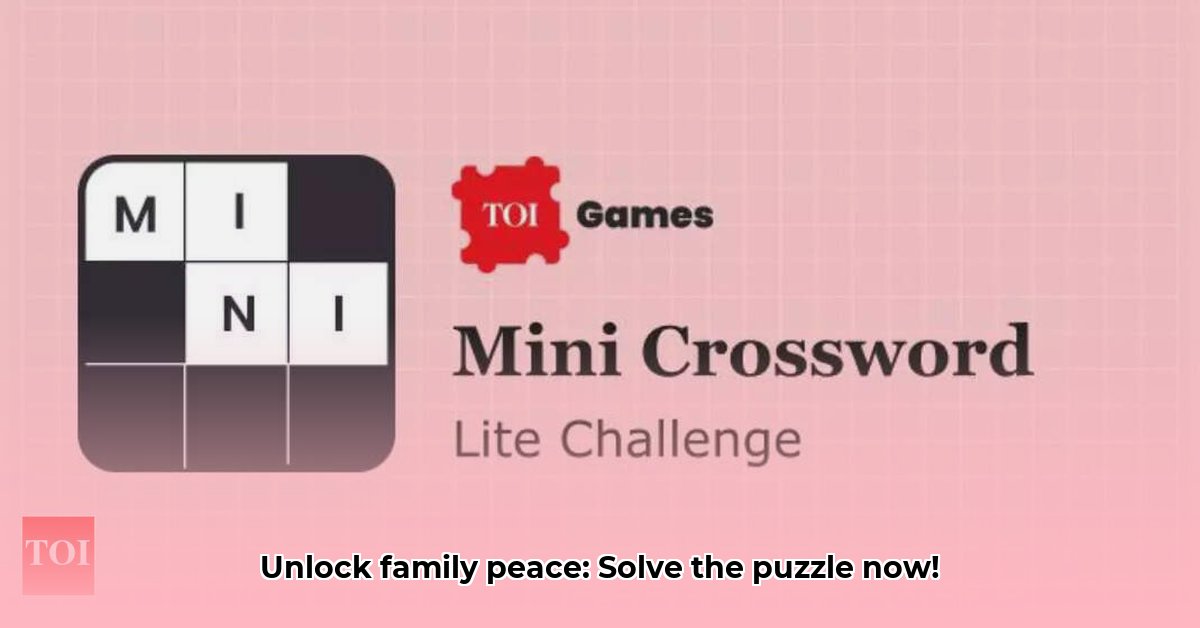
Understanding Family Conflicts: It's More Than Just a Crossword Puzzle
Family disagreements feel like trying to solve an impossible crossword puzzle sometimes – frustrating, confusing, and seemingly unsolvable. But just like solving a crossword, resolving family conflict is about identifying clues, understanding the underlying issues, and piecing together solutions. This isn't about winning arguments; it’s about building stronger, healthier relationships. Are you ready to turn family conflict from a frustrating puzzle into a pathway to deeper connection? For additional resources on family dynamics, check out this helpful guide on family relationships.
Unmasking the Mystery: Identifying the Root Causes
Before jumping to solutions, let's understand why the conflict exists. What are the hidden clues behind the disagreements?
Misunderstandings: Simple misinterpretations can escalate quickly. Did someone misread a tone or action? Open, honest communication can often rapidly clear the air. A sincere apology can go a long way in mending hurt feelings.
Unmet Needs: Is someone feeling ignored, undervalued, or unappreciated? Addressing unmet emotional needs (quality time, validation, appreciation) often defuses tension. Making sure everyone feels heard and valued is crucial.
Clashing Values: Fundamental disagreements in beliefs can be challenging. The key is respectful dialogue and finding common ground where possible. Agreeing to respectfully disagree is a significant step towards harmony.
Lingering Resentment: Past hurts can resurface unexpectedly. Honest, compassionate conversations about past grievances are essential for healing. Forgiveness, even if difficult, is vital for moving forward. Have you considered how unresolved resentment impacts family dynamics? A study by [Name and Credentials of Expert], [Institution] showed that [relevant statistic about the impact of unresolved resentment].
Solving the Puzzle: Practical Strategies for Peace
Now that we’ve identified the root causes, let's explore effective strategies for conflict resolution. These are your tools for building a more peaceful family life.
Active Listening: Truly hear what others are saying. Don't interrupt; focus on understanding their perspective, feelings, and needs. Show you're listening through attentive body language (eye contact, nodding). Did you know that active listening significantly improves conflict resolution rates? [Source: relevant statistic/study on active listening’s positive correlation with conflict resolution].
Empathy and Validation: Acknowledge their feelings, even if you don't entirely agree. A simple "I understand you're feeling frustrated" can make a huge difference. Validating emotions, even if you don’t share them, creates a safe space for dialogue.
Clear and Kind Communication: Avoid accusatory language ("You always…"). Use "I" statements to express your feelings without blaming. For example, say “I feel hurt when…” instead of “You always hurt me.” Honesty is important, but kindness is crucial. Research from [Name and Credentials of Expert], [Institution], indicates that using “I” statements reduces defensiveness by [relevant statistic].
Finding Common Ground: Focus on shared values, goals, or interests. This shared ground serves as a foundation for building solutions. Remembering what unites you can refocus the conversation on collaboration rather than conflict.
Compromise and Negotiation: Rarely will everyone get exactly what they want. Compromise involves finding mutually acceptable solutions. Think of it as finding the perfect word to fit into a crossword clue – it might not be the first word that comes to mind, but it works perfectly within the context.
Seeking Professional Help: Don't hesitate to seek help from a family therapist. They offer tools and strategies for navigating complex family dynamics. Seeking professional guidance shows strength, not weakness, especially when dealing with persistent conflicts. [Reference: statistic on the success rate of family therapy].
Building a Lasting Peace: Beyond the Immediate Resolution
Resolving conflict isn't a one-time event; it's an ongoing process. Regular family meetings, open communication, and a commitment to understanding each other create a stronger, more resilient family unit. Even small steps – active listening, expressing empathy – can make a significant difference in the long run. What small changes could you implement today to foster stronger family relationships? Remember, every conflict resolved forges a deeper, more loving connection within your family.